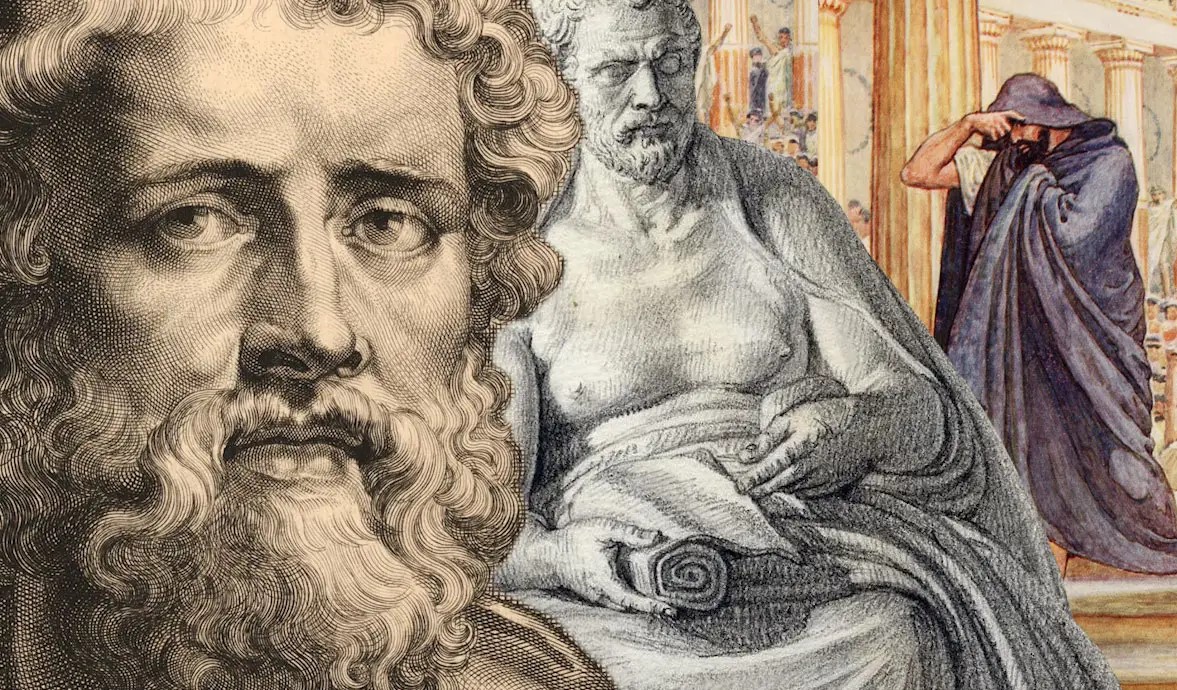He gained great fame by writing the defenses of the Athenians who had a lawsuit: Who is Demosthenes?
After 355 BC, he continued his success in private cases in public cases and made successful speeches on topics such as finance, taxation, administrative reform, and foreign policy. He committed suicide by drinking poison in Kalaureia, where he escaped.

(384-322 BC) Athenian orator and statesman. With his success in the art of oratory, he had an impact on the political developments of his period. He was born in Paiania, near Athens, and died in Kalaureia on October 12, 322 BC. He was the son of a prominent sword maker in Athens. He had to raise himself at a young age to get his father's inheritance from his guardians. He took oratory and law lessons from Isaeus, one of the famous lawyers and orators of the period. He tried to resolve the conflict between himself and his guardians through legal means, and his speeches in court were his first attempts at the art of oratory. In the following years, he gained great fame by writing the defenses of the Athenians who had a lawsuit. After 355 BC, he continued his success in private cases in public cases and made successful speeches on issues such as finance, taxation, administrative reform, and foreign policy. Thanks to the support he provided in the Assembly of Athens, he became an active person in the political life of the city.
In his speeches after 351 BC, he warned the Athenians against the danger of Macedonia, which increased with the accession of Philip II. He used the art of oratory to mobilize the people of Athens against Philip II and, in later years, against his successor, Alexander.
Demosthenes (384 – 12 October 322 BC) was a Greek statesman and orator in ancient Athens. His orations constitute a significant expression of contemporary Athenian intellectual prowess and provide insight into the politics and culture of ancient Greece during the 4th century BC. Demosthenes learned rhetoric by studying the speeches of previous great orators. He delivered his first judicial speeches at the age of 20, in which he successfully argued that he should gain from his guardians what was left of his inheritance. For a time, Demosthenes made his living as a professional speechwriter (logographer) and a lawyer, writing speeches for use in private legal suits.
He became a persistent spokesman for the democratic ideals of the Athens site. After the defeat of Athens and its allied cities in Khaironeia in 338 BC, he worked to gain the support of the Greek cities against Macedonian expansionism. It was decided to present a golden crown to Demosthenes for his services to democracy, but upon the objection of one of his rivals, Aeschines, the situation became the subject of a lawsuit. He won the case by defending himself with his famous speech ("On the Crown"). However, he fell out of favor in later years. He had to leave Athens after losing a case in which he was accused of taking bribes. The Athenians, who were trying to recover after Alexander's death, called Demosthenes for help. But he was sentenced to death after Athens was invaded by Macedonia in 322 BC. He committed suicide by drinking poison in Kalaureia, where he escaped.
About sixty orations are bearing Demosthenes' name, but it is doubtful that many of them are his. In his speeches on public cases such as Kat'Androtionos ("Against Androtionos"), Kata Timokratos ("Against Timokrates"), and Kat'Aristocrates ("Against Aristocrates"), he had a powerful argumentative style that skillfully demonstrated and proved the issue, as well as the administrative and administrative aspects of the site. He also attracts attention with his ability to understand the issues concerning political life.
He combines his mastery in the art of oratory with the skills he developed as a politician in his speeches on issues concerning the foreign policy of Athens, titled Peri Symmorion (“On the One from Symoira”) and Hyper Megalopolitan (“On the One from Megalopolis”).
Rather than being an orator who draws attention with his ability to speak without preparation, Demosthenes is an orator who studies the subject he is discussing in detail in advance, enriches his discussions with examples from Greek history, and defends his ideas with a measured but passionate and enthusiastic attitude. He is known as one of the greatest ancient Greek orators, with his high persuasive power and style that makes use of rhythm and the musicality of words.
He was seen as one of the leading names in the art of oratory during the Middle Ages and the Renaissance Period. After Demosthenes, the art of oratory lost its importance in Ancient Greek society with the collapse of the political environment of which it was a part.
-------------------------
Demosthenes: 7 Key Speeches & Their Influence
Demosthenes is one of antiquity’s most influential orators. He fiercely advocated for Athenian autonomy against the growing hegemony of Philip II of Macedon.
https://www.thecollector.com/demosthenes-speeches/
